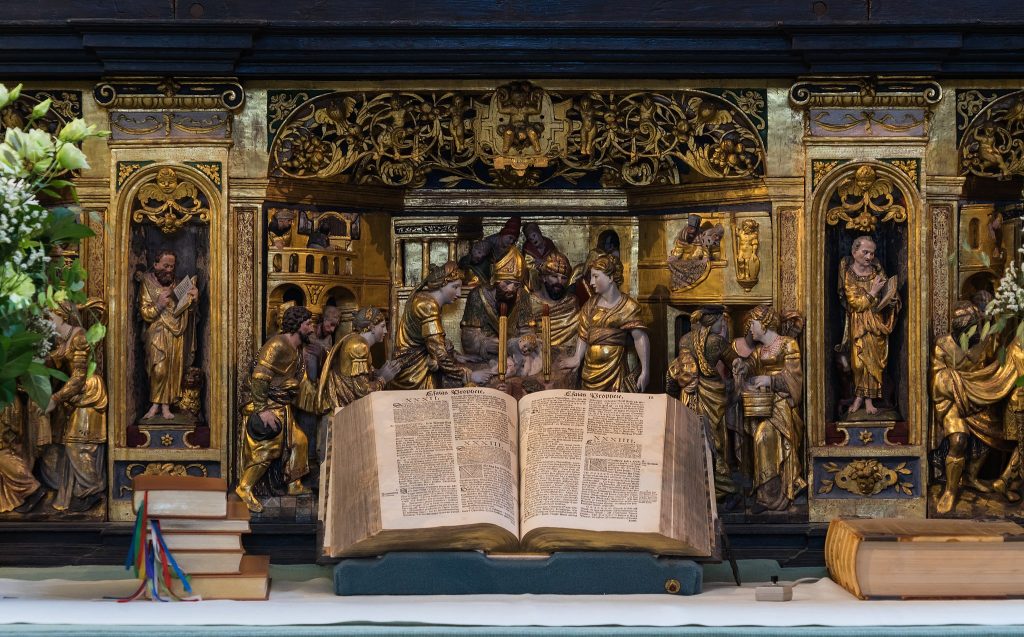During this season, when the liturgical year calls us to reflect upon the incarnation of God, consider the powerful symbol of the book of the Gospels at Mass. Our reverence for the book is a prayerful attitude we inherit from our Jewish ancestors. Recall this story described in the book of Nehemiah in the Old Testament (Neh 8: 2, 4-6):
“The whole people gathered as one. … They called upon Ezra the scribe to bring forth the book of the law of Moses. … Ezra the priest brought the law before the assembly. … Ezra read out of the book from daybreak till midday…and all the people listened attentively to the book of the law. Ezra the scribe stood on a wooden platform that had been made for the occasion. … Ezra opened the scroll so that all the people might see it, for he was standing higher than any of the people. When he opened it, all the people stood. Ezra blessed the LORD, the great God, and all the people, their hands raised high, answered, ‘Amen, amen!’ Then they knelt down and bowed before the LORD, their faces to the ground.”
The Jewish people in the Nehemiah story generally did not read. Books were not a part of their lives. God’s presence was made known to them through the visual object of the book and through the word proclaimed from the book. The story describes the ritual actions of the community: The people gathered, the scribe brought forth the book and stood on a high platform, the people stood when the book was opened, and knelt in humility when the word was proclaimed.
These actions made visible for them the invisible reality they knew in their hearts — that God was with them in and through the book and the Word proclaimed. This was the central focus of their lives as the people of God. It is what held them together as a people. In a sense, it is a mutual presencing: the Book and the people. God in the Word is revealed through the action, reverence and belief of the people, and the community gathered before the book become the people of God through the presence revealed in the Word.
In the Mass, the deacon carries the book of the Gospels high in our opening procession, passing through the gathered assembly, symbolizing how, over many generations, the Word of God continues to hold people together and lead them in the way of God for the world. Our liturgy takes the Jewish reverence for God in the Word and extends that to the life of Christ.
By placing the Book of the Gospels clearly on the altar, we see visually the truth that “the Word became flesh and dwelt among us” (John 1:14). Through this elevation and exposition of the Book, in the opening procession, we see Christ as both Word and Sacrament.
As Goffredo Boselli points out in “The Spiritual Meaning of the Liturgy,”
“Before being read and heard, the book is seen. … The church presents to the faithful gathered in assembly the sign of their identity; the Evangelarium (book of the Gospels) therefore has a triple symbolic function.
First, elevating it before the eyes of the people, the church recalls the superiority and authority of the word of God over every human word.
Secondly, the church declares that the book is shown to all because it belongs to all, and that all have free access to the word of salvation.
Third, the church witnesses to the reality that this singular word of salvation creates a relationship among the believers who gather, for they recognize themselves as participants in a unique covenant.”
This Word-covenant, remembered and renewed every time we gather for Mass, is revealed to us through our participation in the Liturgy of the Word and in the Liturgy of the Eucharist. We are nourished at the Table of the Word and at the Table of the Eucharist. It is Christ-the-Word who is Christ-the-Eucharist.
“The Word became flesh and dwelt among us.”
“In the beginning* was the Word, and the Word was with God, and the Word was God. … What came to be through him was life, and this life was the light of the human race; the light shines in the darkness, and the darkness has not overcome it.”(John 1: 1-5)
Christ is God’s Word; his life is that same Word-incarnate. We who are the church, who share in the Eucharist — seeing, hearing and sharing in the Word made flesh — extend the incarnate Word to all the world. This Christmas, may we all be renewed in this holy incarnation covenant. May we be Word and Eucharist in all we think, do and say.
Start your day with Always Forward, our award-winning e-newsletter. Get this smart, handpicked selection of the day’s top news, analysis, and opinion, delivered to your inbox. Sign up absolutely free today!

